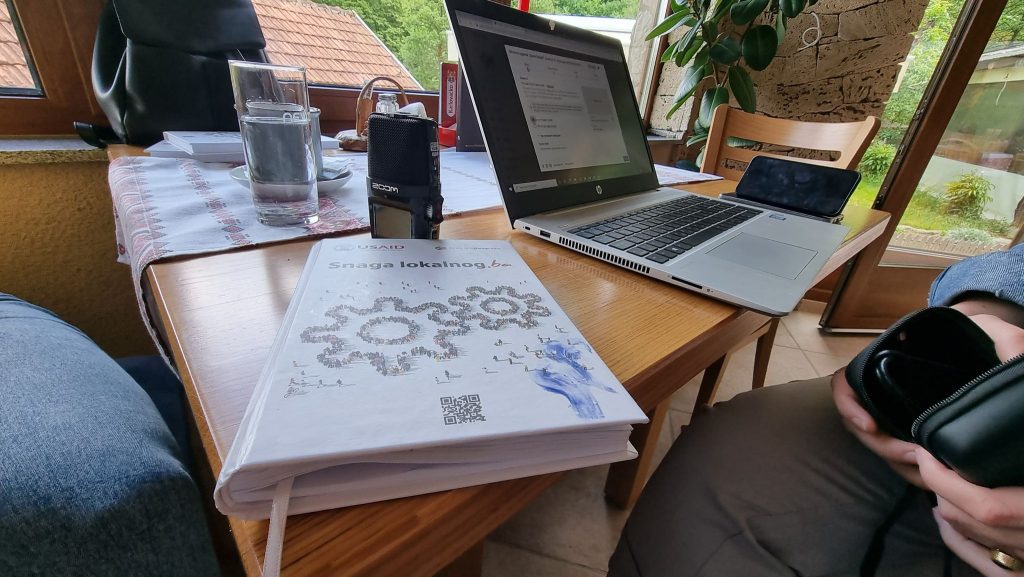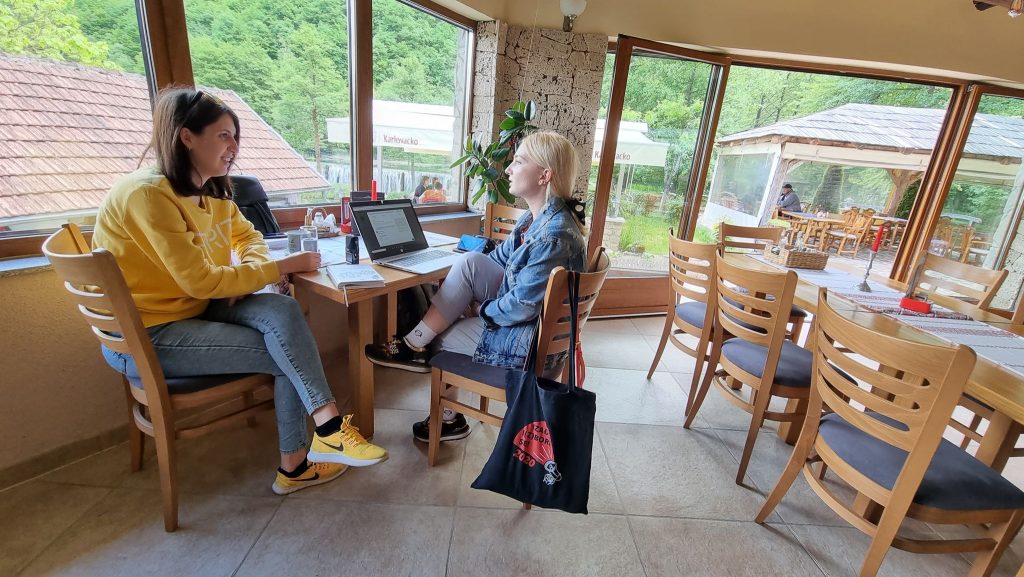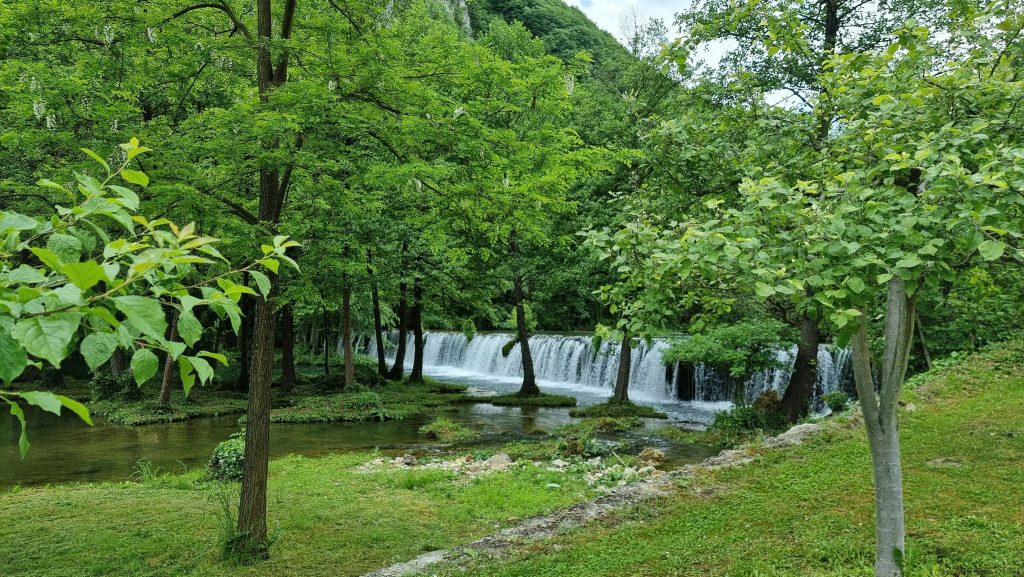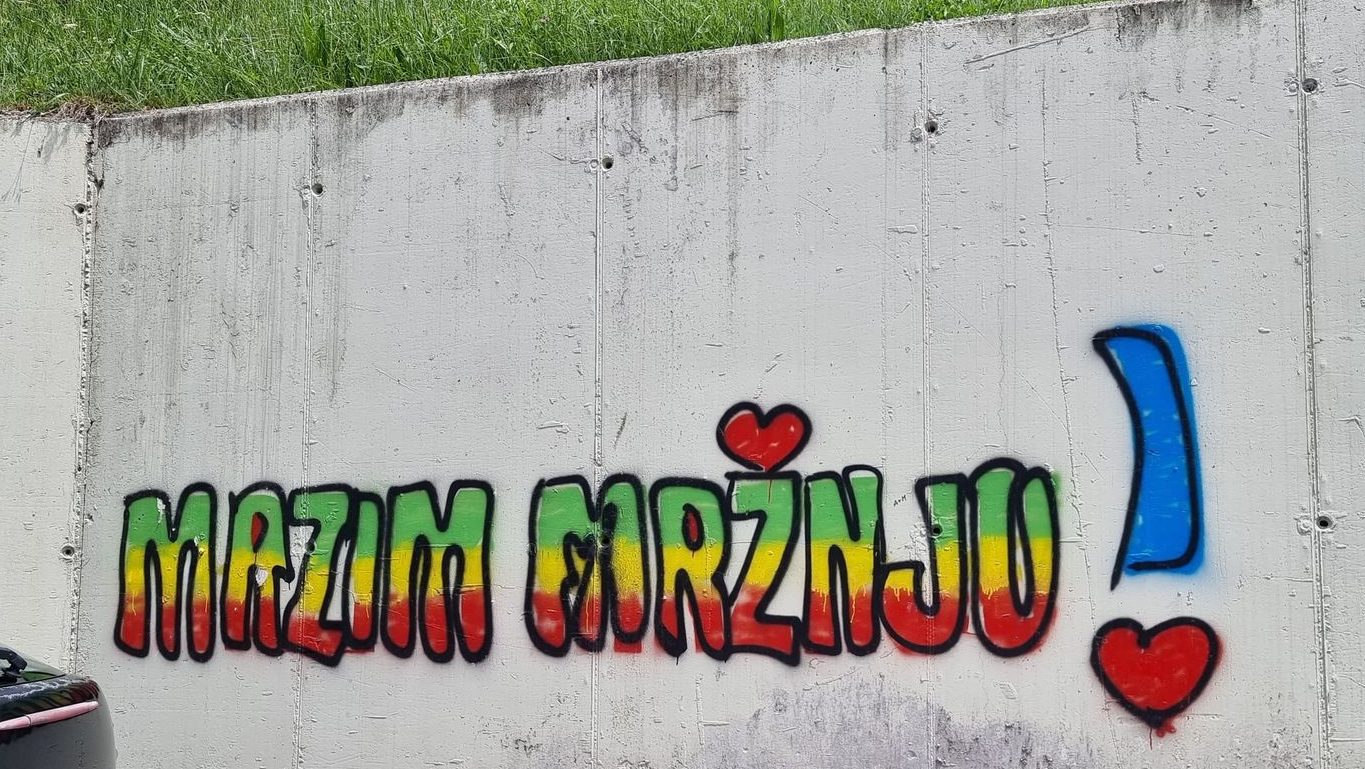Sara Velaga is a young and very successful journalist, with quite notable results as an activist. We talked with Sara about activism in her hometown Jajce, as well as other opportunities and challenges of this royal city.
At the very beginning of the conversation, she showed us how active she is in her local community and how much she tries to bring innovations from all areas in which she works, from those civic initiatives to her professional ones. And this motivation and readiness for change dates, as she says, from high school, her departure to Banja Luka, when she had the opportunity to see how some things can be different and better. Her original desire, from the age of fifteen, was to reduce the gap between national inequalities. The first big activity she encountered and after which she knew that her path in the sphere of activism would be continued, was the moment when high school students in her local community rebelled against “two high schools under one roof”. And now, as she emphasizes when she looks back on her activist path, she is very happy with the fact that she has remained consistent with herself and her principles and topics that fascinate her, such as marginalized groups, activism, human rights and similar. She believes that her work in the media has greatly influenced the visibility of her activities and greatly contributed to the successful implementation of certain initiatives, which she pointed out during her work in journalism, which she continues to point out.

When it comes to cooperation with other organizations and activists, Sara points out that during her engagement, cooperation was very important to her, but also hanging out with Samir Beharić, a prominent activist who initiated many kinds of cooperation through projects with other organizations or media, which still attracted attention and make future actions more successful. Sara emphasizes that she has a very good cooperation with the Center for Social Work, especially the cooperation with the director of the Center, with whom she cooperated in several initiatives, such as the marginalization of women and women who have survived violence. She also emphasizes the importance of cooperation with the Association Vodopad ljubavi that deals with the issues of children with Dawn syndrome and children with developmental disabilities. Working with them inspired her to start a humanitarian action with a friend, which was originally supposed to be a Christmas initiative, but due to the good response, they managed to connect with Merhamet, the Soup kitchen, the Vodopad ljubavi and the Red Cross, thus helping different groups of people.
What she noticed during the realization of this initiative is the fact that Jajce lacks a more formal group of young people, because, as she says, the actions that have been organized so far mostly have a national sign. So, in Jajce there is the Croatian Cultural Society “Napredak” which has its own Croatian youth who are generally open to cooperation with everyone, but when you look at the Statute, or pay attention to the activities carried out by, say, various events that clearly show that the program and agendas are closely connected with nationality.
When it comes to joint activities, the last one that was organized was cleaning the shores of Lake Pliva, an informal activity, which she claims are very commendable in one aspect but on the other are short-term initiatives that last mostly one day and do not leave trace and motivation to continue that kind of activism in the future. She claims that people who mostly stay in nature, fishermen, nature lovers, athletes who have previously pointed out, in various ways, to the importance of preserving Lake Pliva, are the most responsible for this eco – action. About a hundred people joined the action. As our interviewee states, this is certainly another in a series of actions that were not aimed at young people.
Our interviewee points out that the passivity of young people probably is encouraged due to the lack of space and content intended for young people. She remembers her childhood days, more precisely the period of primary school, when there were many more activities for young people in the museum premises dedicated to the AVNOJ session and cooperation with the then Youth Center, such as events, cultural activities and other similar activities. Throughout the story, she believes that the passivity of young people is expressed, she points out that this is visible on the people who are present at these initiatives, and those are mostly the same people. She is surprised when she sees some new faces, while for young people she thinks that they are far more active in online media, when they support all the above-mentioned actions and later when they need to show up and take the initiative, they are simply not there.

Sara points out that young people support change, but changes that are replacing action on the street with a like on Facebook. Because, as she says, for many previous initiatives that were launched, such as the cleaning action of the fortress in Jajce, waterfalls, etc., young people were mostly active and loud on social networks, but creating opportunities to use what they have in their environment remained neglected.
Sara believes that the history in Jajce and its sights are underused and that this could be on a much larger and better level.She points out that it is a bit sad that the only activity that represents the Fortress is when once a year, the Knights of Jajce go to the Fortress and when children under 10, and those a little older, have the opportunity to get acquainted with the history and significance of sights in their city.
Our interviewee states that there was a lot of potential for organizing many festivals and events for young people, except for a few attempts to make something happen in Jajce, such as the festival at the fortress, there were no serious initiatives to implement it. In a recent conversation with the director of the tourist organization Jajce, the idea of a large electronic music festival was mentioned, on a large plateau of waterfalls, where more than 2,000 young people from Europe would be hosted. Sara is not very optimistic with this idea, but she thinks it is ungrateful to have ideas to attract people from Europe when there is a need for local action and attracting people from the local communities.
From the tourist aspect, she also mentions irregularities that could increase the tourist offer, such as the height of the waterfall plateau, where there was once an attempt at a concert, but because the plateau is low, the concert was marked by rain, as well as visits by every tourist who wants to take a photograph at a waterfall. Sara also mentioned waterfall jumps, which are again more interesting to people from the area than young people from Jajce. Young people from Sarajevo and Mostar come, while we have only two or three young persons from Jajce. She expresses her dissatisfaction by stating how sad it is to live in a city that abounds in many potentials, many of which are not used. Our interviewee states that during the previous year (2020), many activities were not organized due to the COVID-19 pandemic, but she notes that this year they are slowly recovering.

Sara points out some positive examples, such as the youth self-employment project, where she mentioned a positive example, her fellow citizen and friend who returned from his studies in Vienna and decided to start his own business in Jajce. It is a fast-food store “Svemirko” whose concept he managed to connect with the famous poet Nikola Šop who loved and explored the universe.
When asked how some new kids, such as her younger brother and other high school students, view the situation in Jajce, she says that more than 90% of these young people have the same mindset, which is to finish school and leave Jajce as soon as possible. Also, it is noticeable that young people like her brother do not understand her activism in the field and do not understand why it is important to do it, so she often discussed with him about it, and he often asks her “what benefits do you have from it” by not accepting any reality other than the material one, all these young people strive for the same ideology, and that is the pursuit of the material. Regarding the opportunities for employment of young people, Sara says that they are at a very low level, she points out that a couple of companies work and employ exclusively the male population, the catering industry dominates, with most young people, while most competitions in other municipal and other institutions are mostly published just because they are required to do so by law. For opportunities related to her profession, Sara states that there are very few job opportunities and that they do not have any special opportunities for people who want to work as journalists. But she also believes that the opportunities available to young people need to be better defined. During her internship, Sara got an opportunity she was not satisfied with because she did not have the opportunity to learn new things and provide her contribution, and for that reason she asked for a transfer from the mayor’s office to the portal Jajce online, which was started by her friend Sandro Nuhanović and with whom she has a great cooperation. In her previous job, she was surprised by the fact that there is not much work in state institutions. She is currently satisfied with her engagement on the Jajce-online portal, which was originally launched as an informal media, but over time has become a real portal that has an enviable attendance and trust of citizens and the general public. In addition to the strong desire for her to give her contribution to Jajce, she was again struck by the fact that her work is again appreciated more in Banja Luka and Sarajevo than in her hometown Jajce.

Sara’s future plans are currently related to staying in her hometown Jajce, primarily for private reasons, and internships. Sara also currently works online for Radio Free Europe, so she made the decision to be safe in her hometown of Jajce by the end of the year, but it is hard for her to imagine that she will find the job she loves in her local community again.
At the end of the conversation, we touched on issues related to the youngest citizens, health centers, nursing homes, Sara pointed out that there are kindergartens that are paid and whose capacity is not enough for all children, that parents sometimes register children in kindergarten three years before the enrollment. Although there is an initiative to move kindergartens to another location, which is more appropriate and larger in capacity, this has never been realized. The situation with the nursing homes and the health center is also not good.
At the end of the conversation, Sara encouraged young people not to give up on their goals, to fight for their rights and to react in time, because in our country, every minute counts and everyone counts.
Interviewed by: Maida Zagorac and Mirjana Ribić





